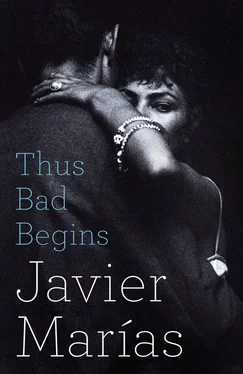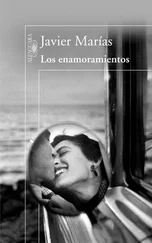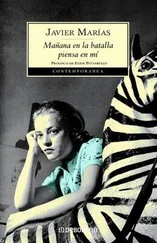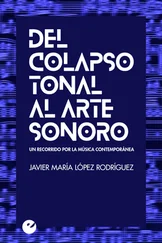Despite his short stature, I found Lom’s presence intimidating, even terrifying, and not just because of the fear he had provoked in me as a child in the darkness of a cinema (I remembered him in a hat in North West Frontier with Lauren Bacall and Kenneth More, again playing a treacherous fanatic). His eyes were as glacial as they were magnetic, so intensely cold as to be almost troubling. His very thin upper lip (completely out of proportion with his rather plump lower lip) was clearly one of the weapons he used to radiate the air of sardonic cruelty that remained intact even though he was, by then, sixty-something years old. And yet he appeared very affable and friendly, and, having given his vehement fictional peroration, he seemed relaxed and contented, with a cigarette in one hand and, in the other, an android-green silk handkerchief, with which he was playing almost as if he were a magician. ‘I couldn’t possibly do that, boy.’ And Muriel shot me a chiding glance with his one eye. ‘It’s about time you learned some manners, Juan. Show some respect for the great man. Come on, we haven’t got much time before shooting begins again. But don’t leave out any important details. Come on, tell me.’ And to give me my cue in English, he added: ‘So, tell me, Juan.’ He shifted easily into English, as I had seen him do before with Palance and Towers.
And I did my best to relay to him my conversation with Van Vechten. Now and then, I would turn to Lom, so as not to exclude him and as if this were also his business. What we were talking about would have been of no interest whatsoever and wouldn’t even have made much sense, but I noticed that he was nevertheless paying close attention, as though he were one of those very alert individuals, incapable of not paying attention to whatever was going on around him, and interested in any story or conversation. Perhaps he was one of those actors who absorb everything, just in case it might be of use later on. When it came to reporting the Doctor’s final words to Muriel, those that had seemed of possible relevance to the investigation, I translated them clumsily into English and then asked permission to repeat them in Spanish, apologizing beforehand to the eminent Mr Lom, who, to me, was still Ben Yusuf and Napoleon:
‘Forgive me, Mr Lom, but at this point, what the friend we’re talking about said was somewhat ambiguous and complicated, and it would be best if I gave Mr Muriel the actual Spanish.’
Herbert Lom waved his handkerchief in the air in a gesture of largesse and generosity, so extravagantly in fact that it touched my nose, making me sneeze, not once but three times.
‘No, of course, go ahead,’ he said, adroitly avoiding these explosions and waiting until I had stopped. ‘It’s all very interesting, I must say. But, please, Juan, feel free.’
He had caught my name first time. I felt very honoured and, given his cinematographic antecedents, rather troubled too. I had seen him treat people he was planning to kill with equal deference.
Muriel looked concerned, or possibly discouraged or disappointed, when he heard the words his old friend had spoken. As if he would have preferred me to come back to him empty-handed, having made no progress, or to be able to reject what I had to say, which seemed, however, to affect him quite deeply.
‘Did he really say that?’ he asked in a gruff voice, seeking some opening for his incredulity. ‘He actually said, “Nothing gives one more satisfaction than when a girl doesn’t want to do it, but can’t say No”? Are you sure, Juan?’ Out of respect for Lom he was still speaking in English and translated those words more precisely than I had when I gave him my version.
‘Yes, I’m sure, Don Eduardo, I mean, Eduardo.’ The great actor’s presence prompted me to add the ‘Don’, which I hadn’t for a long time. I didn’t want him to think I was being overfamiliar with my employer. ‘I have a very good memory. Give or take a word, that’s exactly what he said. Does that clarify or illuminate anything as far as you’re concerned?’
‘Possibly. And what did you say? Did you try to draw him out? That’s what I told you to do, to encourage him to talk. That was obviously the perfect opportunity.’
‘Yes, of course. I told him I didn’t quite understand, I asked him what he meant by “resentment”. I asked him to explain.’
‘And?’
‘And nothing. He burst out laughing and didn’t answer. And just then a niece of García Lorca’s joined us — she often goes to that same disco — and the conversation took a different direction. She’s half-American and has worked as a dancer in New York. She’s very pretty, a few years older than me. The Doctor couldn’t keep his eyes off her legs and he had a go at chatting her up, but I very much doubt he’ll get anywhere. She has a partner, a painter. And, to be honest, I didn’t want to return to the subject later in case it looked like I was being too nosey. Perhaps I should have persisted. But I think he’ll be more prepared to talk on another occasion if I don’t insist too much.’
‘All right, that’s enough,’ said Muriel somewhat dismissively, or perhaps he was merely distracted, weighed down by his own thoughts.
Then I told him what I found most bewildering: how did Van Vechten manage to get anywhere with Maru or with my other girlfriends if he didn’t pay them or offer anything in exchange? This was a mystery to me. Muriel said nothing, as if he too were asking himself that same question. Or perhaps he was thinking about the past, perhaps his thoughts were focused on that.
Seeing us both sunk in joint meditative silence, Herbert Lom intervened, with an elegant wave of his large handkerchief. This time it flicked my eye, and for a while I had to keep that eye closed, as if I had a speck of dust in it or, worse, some fierce insect. Or as if Muriel’s hard eyepatch had been placed over it.
‘Insofar as I have grasped the nature of the matter in hand,’ he said in his fine, deep voice, his eyes as sharp as nails, just as they were on the screen, ‘if this friend of yours, this Dutch doctor, neither pays for nor offers anything in exchange; if he neither promises nor tempts, then he must demand. There is, in principle, no other option.’
Muriel and I looked at each other in surprise, we had assumed he wasn’t much interested in our conversation, even though we were, contra natura , speaking in English (my spoken English was only average at the time, though it improved subsequently). But he had, it seemed, quickly grasped the situation. A bright, intelligent man, perhaps as fearsome as his characters, who had possibly been created simply so that he would play them.
Muriel was about to speak, but I got in before him:
‘What do you mean, Mr Lom? Demand what?’ I don’t know how I dared question him so directly. He may have been short, but I still found him quite intimidating.
‘It’s obvious,’ replied this Lord of the B-movie, as if it went without saying. He threw his handkerchief in the air and caught it on his forearm, like a falconer receiving his returning falcon. It missed me this time, but I was beginning to grow weary of that android-green piece of cloth, or perhaps it was Nile green, which was fashionable that season, I had seen Professor Rico sporting ties and (rather smaller) handkerchiefs in that same colour, his handkerchief protruding from his top jacket pocket. ‘If someone wants something that the other person denies him, and he’s not prepared to offer anything or to pay for it, then he’s in a position to demand it. If that doesn’t work, then his one bargaining chip is silence.’
I wasn’t following. Muriel, it seemed, was, because he asked:
‘So what the Doctor will have given in exchange is a promise not to do or say something that could prove detrimental to those women’s reputations. Is that what you mean, Herbert?’
Читать дальше












